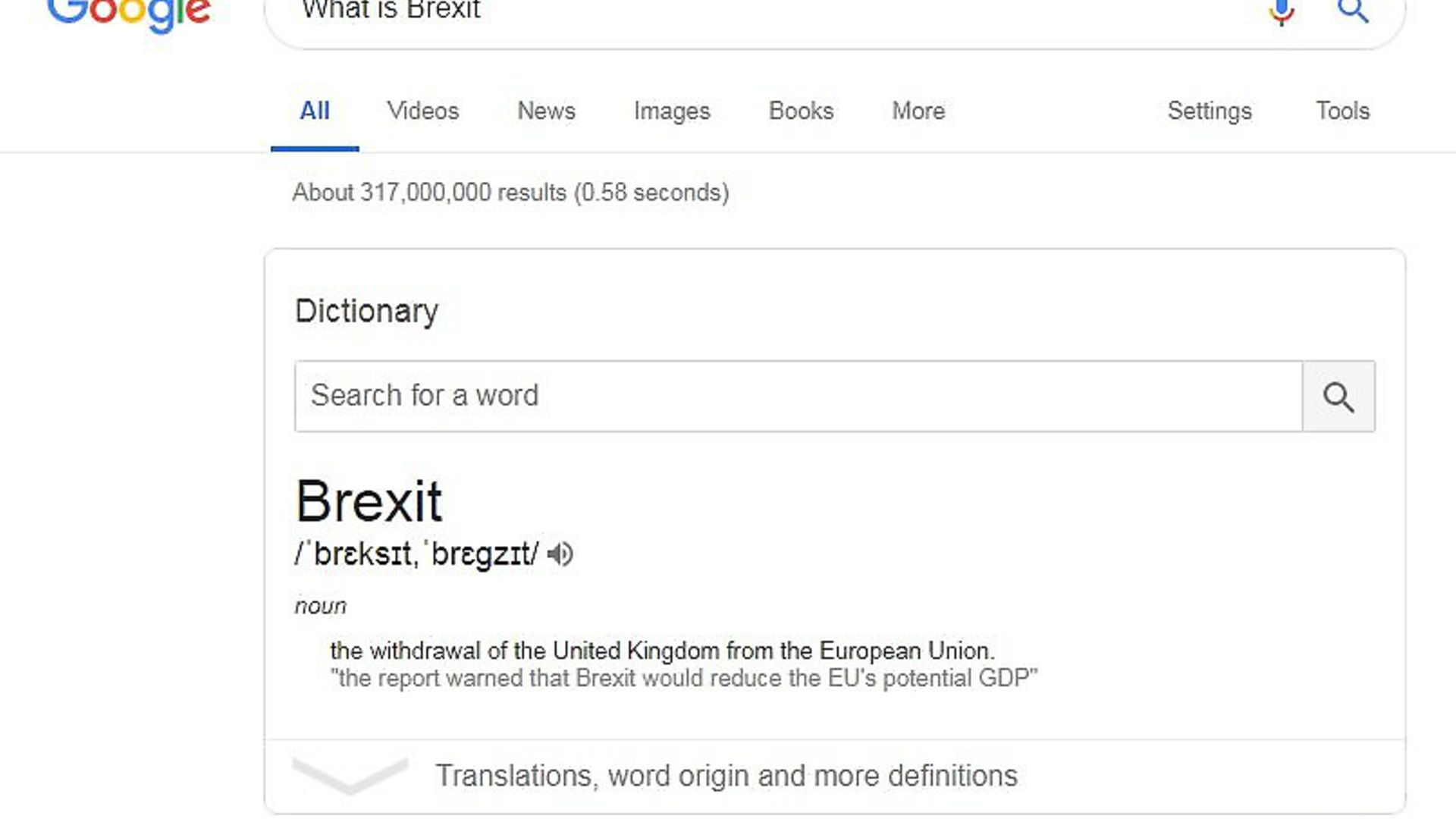
The British public knew exactly what they were voting for, the Brexiteers tell us – but last night’s most-searched questions on Google suggest otherwise.
The dismissal of Theresa May’s deal last night has actually brought more questions than answers for the British public, at least if their Google searches are to believed.
The world’s biggest search engine has released information on the most-searched questions following the vote, ranging from how MPs voted to WTF WTO is.
Here our answers to the biggest questions.
Did my MP support Brexit?
With more than twice as many MPs voting against the PM’s unloved deal than for it, chances are high that most people’s elected representative went against the government.
You can find a full list on which way your honourable member swung here,
What happened with Brexit?
After more than a year of negotiations, first under David Davis and then successor Dominic Raab, May presented her EU Withdrawal Agreement to Parliament in November. It was immediately dismissed by hard Brexiteers within her own party, leading to a string of Cabinet resignations including, er, Davis and Raab.
Hours before Parliament was due to vote on the deal in December, correctly sensing a heavy defeat, the PM delayed the vote and returned to Brussels to seek reassurances about its implications.
Despite her efforts, MPs rejected the deal heavily in a meaningful vote last night which was the largest Commons defeat in British political history.
What is WTO Brexit?
Many clever Brexiteers who support leaving the EU without a deal have argued that a simple solution would be for the UK to trade with the rest of the world on rules set by the World Trade Organisation (WTO).
WTO rules decide the level of tax imposed on goods whenever they cross a border, known as tariffs, where countries do not already have an agreement.
There are no tariffs on UK imports from the EU, and tariffs on imports from other countries are relatively low thanks to existing trade agreements. Trading under WTO rules means tariffs will be much higher.
The UK has yet to negotiate any new trade deals with any other countries in preparation for leaving the EU, meaning WTO rules would apply to all imports and exports. The EU has signed more than 50 trade agreements with non-EU countries which Britain would cease to be a party to.
Until new trade agreements are signed, anything imported into the UK or exported but UK businesses will be subject to these much higher taxes, damaging businesses and affecting the prices of nearly all goods found in the shops.
In addition, Britain is economically dependent on service industries, barely touched by WTO rules, and it is hardly a viable model given a single market that in 2016 provided 54% of our imports of goods and services and was the destination for 43% of British exports. Not great, then.
What will happen now with Brexit?
Before anything else can happen on Brexit, May’s government must survive a vote from MPs on whether they can still run the country, to be held on tonight.
If the government survives the vote, Theresa May is scheduled to deliver a so-called Plan B for leaving the EU next Monday – January 21.
If the government loses, there is likely to be a general election.
Whichever way the vote goes, and with only 72 days left until the UK is due to leave the EU, many commentators believe the government will delay leaving to negotiate a deal that can command a majority in Parliament and be acceptable to the EU.
Is Brexit cancelled?
Alas, Brexit is not cancelled. A large majority of MPs disagreed with May’s government about the best way to continue, and a sizeable minority of MPs are arguing for a second referendum – but at present the UK is still due to leave the EU on March 29.
How much has Brexit cost so far?
The government set aside more than £4.2bn for Brexit preparations in 2016, not all of which has been spent yet.
A study by the Centre for European Reform in September found that the UK economy was 2.5% smaller than it would have been had Remain won the referendum.
The centre’s deputy director, John Springford, estimated the impact to have cost the Treasury roughly £440m per week – and the website CostOfBrexit.netlify has set up a running total, currently at £59 billion. Imagine giving that to our NHS…
What is the backstop in the Brexit negotiations?
The backstop arrangement outlined in the prime minister’s deal would create a single EU-UK customs area to ensure there is no hard border on the island of Ireland.
This means the UK would continue to follow the EU’s tariffs and rules on customs, avoiding the need for checks between the EU and UK – including Northern Ireland and the Republic – until a new relationship is decided.
Northern Ireland would need to follow some of the EU’s single market rules – including laws on goods, agricultural production, veterinary controls and state aid rules.
It is this point that led many – including Northern Ireland’s Democratic Unionist Party and a number of Conservative backbenchers – to oppose the deal.
But they have yet to explain how, if there is no agreement on trade and customs, a hard border is not inevitable, given that only that way would the EU be able to ensure that other countries are not exporting to the UK (for example, chlorinated chicken that does meet EU safety standards) and then driving it across the Irish border.










